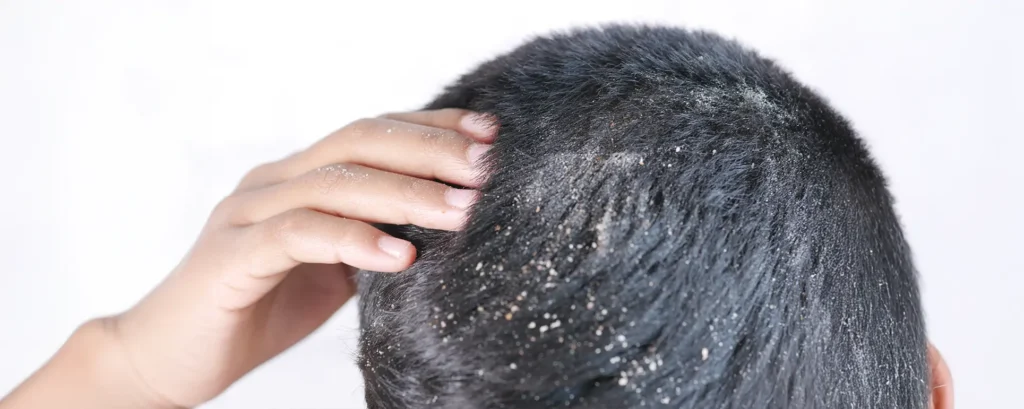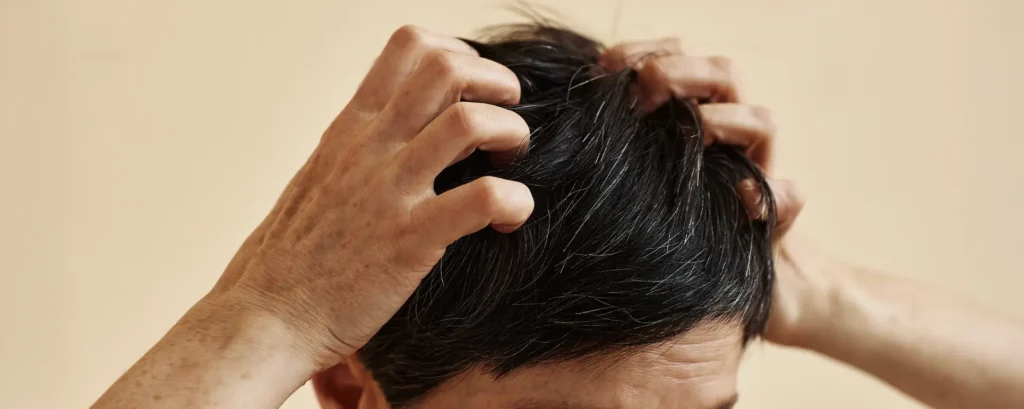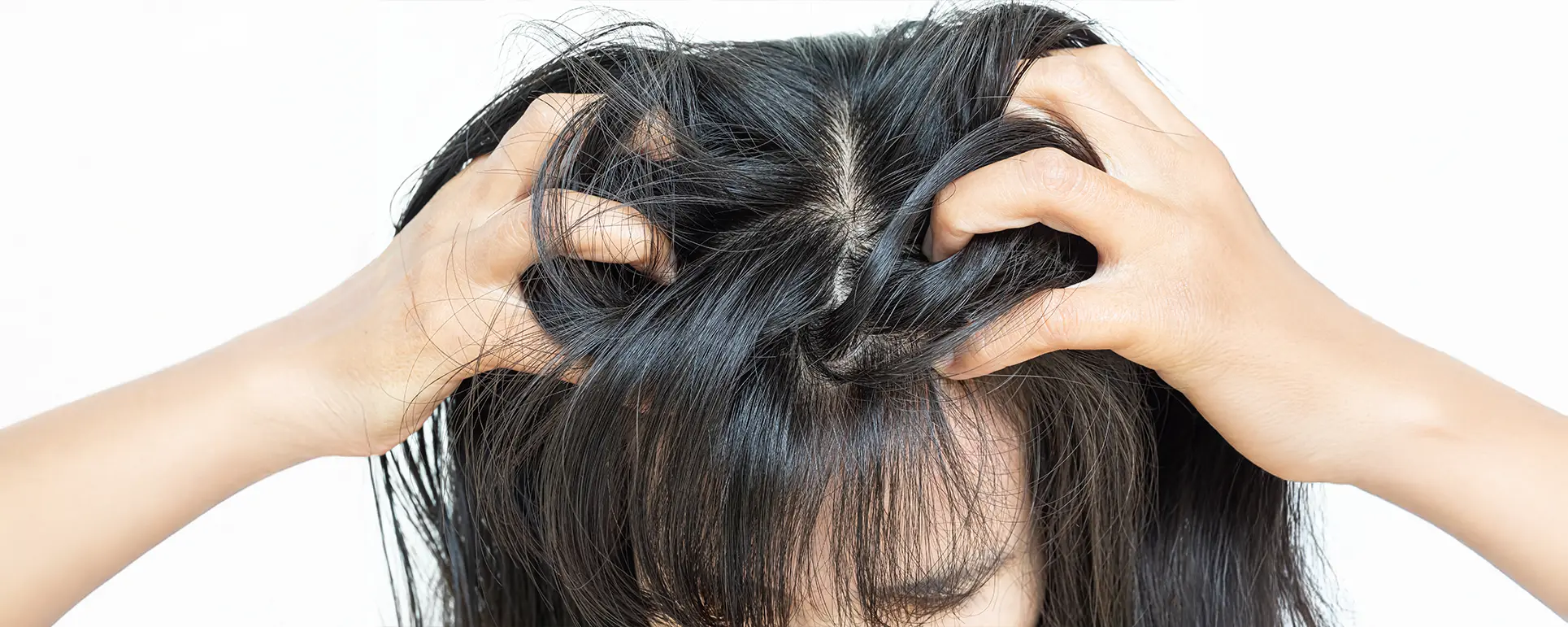Experiencing an itchy scalp without any visible dandruff can be both frustrating and confusing. You might find yourself scratching constantly, trying different shampoos, or even switching hair products in the hope of some relief, yet the irritation continues. Unlike classic dandruff, which is usually easy to spot because of the flakes, an itchy scalp without visible signs can leave you wondering what’s really going on.
The truth is, an itchy scalp isn’t always linked to dandruff. In fact, there are several other possible explanations that often get overlooked. From scalp sensitivity and skin conditions to allergies or even stress, the triggers can vary widely. Some causes are simple and temporary, while others may need a dermatologist’s attention.
Understanding the underlying reason for your symptoms is crucial, because the right treatment depends entirely on what’s actually causing the itch. Applying anti-dandruff shampoo when dandruff isn’t the problem, for instance, might not only fail to help but could sometimes make the irritation worse.
It’s also worth noting that an itchy scalp can affect more than just your comfort. Persistent itching may interfere with your focus, sleep, or confidence, especially if you find yourself scratching in public. While the problem may seem minor, ignoring it can sometimes allow an underlying issue like an allergy, infection, or skin disorder to worsen over time. Taking the symptoms seriously and learning about the possible causes is the first step toward finding lasting relief.
In this article, I’ll walk you through the most common reasons behind an itchy scalp without dandruff, how dermatologists usually diagnose the condition, and the treatment options that can help you finally find some relief. By the end, you’ll have a clearer idea of what might be triggering your discomfort and the next steps you can take towards a healthier, calmer scalp.
Common Causes of an Itchy Scalp Without Dandruff

An itchy scalp can stem from a variety of factors, ranging from skin conditions to lifestyle habits. If you’ve ruled out dandruff but the discomfort persists, it’s worth exploring the following possibilities in more depth.
1. Seborrhoeic Dermatitis
Seborrhoeic dermatitis is one of the most common culprits behind scalp itchiness. It occurs when the scalp becomes inflamed, red, and irritated. While many people associate it with visible flakes, in some cases the irritation happens without any obvious scaling, which can make it harder to recognise.
This condition is closely linked to an overgrowth of Malassezia, a naturally occurring yeast that lives on the skin. When it multiplies too quickly, it can disrupt the scalp’s balance and trigger inflammation. Alongside the itching, people may notice redness, greasy patches, or sensitivity when touching their scalp. Flare-ups are often worsened by stress, hormonal shifts, or even sudden weather changes.
2. Psoriasis
Scalp psoriasis is another skin condition that can cause intense itching without clear flakes. Psoriasis speeds up the turnover of skin cells, leading to the buildup of thick, dry patches. These patches known as plaques are often visible, but in early or mild cases they may be subtle enough that only the itching stands out.
Dermatologists often look for clues beyond the scalp when diagnosing psoriasis. Plaques may appear on the elbows, knees, or behind the ears, and family history can also play an important role in determining whether psoriasis is the underlying issue. Without treatment, scalp psoriasis can progress, becoming more uncomfortable and difficult to manage over time.
3. Allergic Reactions
Sometimes, the very products meant to keep your hair looking good can actually cause irritation. Shampoos, conditioners, dyes, sprays, or gels may contain ingredients such as sulphates, parabens, or fragrances that trigger allergic reactions even if you’ve used them without problems in the past.
An allergic reaction on the scalp can show up as itching, redness, or mild swelling, often without any flaking. The irritation might appear shortly after using a new product, or it could build gradually after long-term exposure. Dermatologists can perform patch testing to identify specific allergens and recommend gentler, fragrance-free alternatives that won’t inflame your scalp.
4. Dry Scalp
A dry scalp is one of the simplest and most overlooked reasons for persistent itching. When your scalp doesn’t have enough natural oils, it can feel tight, uncomfortable, and itchy. Unlike dandruff, which is often caused by excess oil and yeast, a dry scalp doesn’t usually produce noticeable flakes.
Cold weather, low indoor humidity, frequent hot showers, and harsh shampoos are all common culprits. Overuse of styling products or chemical treatments can strip away moisture too. Fortunately, a dry scalp often responds well to moisturising masks, hydrating shampoos, and scalp oils that help restore its protective barrier.
5. Lichen Planopilaris
Though less common than other conditions, lichen planopilaris is an inflammatory disorder that specifically affects the hair follicles. It can begin as an itchy scalp without flakes, making it easy to ignore at first. Over time, however, it can lead to noticeable thinning or patchy hair loss if left untreated.
Because this condition can cause permanent damage to hair follicles, early diagnosis is essential. A dermatologist may carry out scalp biopsies or trichoscopy (a type of scalp imaging) to confirm the condition and recommend treatment, often involving prescription medication to reduce inflammation.
6. Stress and Lifestyle Factors
Not every itchy scalp is directly caused by a skin condition. Stress, poor diet, dehydration, and lack of sleep all affect the body’s ability to maintain healthy skin. Stress, in particular, can worsen existing scalp sensitivity, as it alters hormone levels and immune responses that regulate inflammation.
In these cases, addressing lifestyle factors such as improving diet, sleeping well, staying hydrated, and practising stress-reducing techniques like yoga or meditation can greatly improve scalp comfort and reduce itching.
7. Scalp Infections
Fungal or bacterial infections can also cause scalp itching without visible dandruff. For example, ringworm of the scalp (tinea capitis) often starts with itching and tenderness before patches of hair loss appear. Bacterial infections, on the other hand, can lead to small red bumps or sores that may feel sore and itchy.
These infections need medical attention because they don’t improve with over-the-counter shampoos. Dermatologists may prescribe antifungal or antibiotic treatments depending on the cause, which usually resolves the itch once the infection clears.
8. Nerve-Related Itch (Neuropathic Itch)
Sometimes an itchy scalp isn’t caused by the skin at all but by the nerves underneath. Conditions such as shingles, diabetes, or nerve compression in the neck can trigger a sensation of itching without any visible rash or flaking. This type of itch can feel different more like a tingling, burning, or crawling sensation and often doesn’t respond to topical shampoos or moisturisers.
In such cases, treatment may involve addressing the underlying nerve issue with the help of a dermatologist or neurologist.
9. Hormonal Changes
Hormonal fluctuations, such as those during pregnancy, menopause, or thyroid disorders, can affect the scalp’s oil production and sensitivity. This may result in dryness, inflammation, or itchiness, even when there are no flakes. Women often notice increased scalp irritation during menopause, when declining oestrogen levels affect skin hydration.
Balancing hormones through medical treatment and supporting scalp health with gentle hair care products can help ease these symptoms.
How Dermatologists Diagnose the Cause

Identifying the reason behind an itchy scalp without flakes isn’t always straightforward. Because multiple conditions can cause similar symptoms, dermatologists take a careful, step-by-step approach to reach an accurate diagnosis. This ensures that you don’t waste time (or money) trying random shampoos and treatments that might not actually address the root of the problem.
Detailed Medical History
The process usually begins with a detailed discussion about your health and lifestyle. Your dermatologist will ask questions about your hair care routine, the types of products you regularly use, and how often you wash your hair. They may also explore whether you’ve recently changed shampoos, tried new dyes, or undergone any chemical treatments. Beyond hair care, they’ll want to know about your family history of skin conditions such as psoriasis or eczema, as well as any recent stress, illness, or hormonal changes that could be influencing your scalp.
Physical Examination
Next comes a close physical inspection of your scalp. Dermatologists look for subtle but important clues such as redness, swelling, tiny bumps, greasy patches, or areas of scaling that might not be obvious to the naked eye. The presence or absence of these signs can help differentiate between conditions like seborrhoeic dermatitis, psoriasis, or allergic contact dermatitis. Sometimes they’ll also check other areas of your body like your elbows, knees, or ears to look for patterns that might point to psoriasis or eczema.
Skin Biopsy
If the initial history and examination don’t provide enough clarity, a dermatologist may recommend a skin biopsy. This involves taking a very small sample of skin from the scalp under local anaesthetic. The sample is then examined under a microscope to identify inflammatory, infectious, or autoimmune conditions. Although it may sound intimidating, a biopsy is quick, minimally invasive, and can provide valuable insights that confirm or rule out more complex diagnoses such as lichen planopilaris or lupus-related scalp issues.
Patch Testing
When an allergic reaction is suspected, patch testing is often the next step. During this process, small amounts of potential allergens such as preservatives, fragrances, or chemicals commonly found in hair dyes and shampoos are applied to patches on your skin, usually on your back. After a couple of days, the dermatologist checks for reactions, which can reveal whether a specific ingredient is causing your scalp to itch. This method is especially useful for patients who have tried multiple hair products and still struggle with irritation.
Laboratory Tests
In certain situations, dermatologists may also order blood tests. These are typically used to rule out systemic issues that might contribute to scalp irritation, such as thyroid imbalances, iron deficiency, or autoimmune conditions. While not necessary for every patient, lab work can be crucial in cases where itching is linked to broader health concerns rather than just a scalp-specific problem.
Why This Matters
This thorough diagnostic approach ensures that you receive the right treatment instead of relying on guesswork. Many people spend months or even years trying over-the-counter shampoos, oils, or home remedies without success, simply because the true cause of their itch hasn’t been identified. By pinpointing the exact trigger, dermatologists can recommend targeted solutions, whether that’s medicated shampoos, prescription creams, lifestyle adjustments, or further medical treatment.
Treatment Options for an Itchy Scalp Without Flakes
Treating an itchy scalp isn’t a one-size-fits-all situation. The right approach depends entirely on what’s causing the irritation in the first place. While some people find relief with simple lifestyle changes, others may need prescription treatments from a dermatologist. Here are some of the most common options you might come across.
1. Medicated Shampoos
For conditions such as seborrhoeic dermatitis or mild psoriasis, dermatologists often recommend medicated shampoos. These aren’t your average store-bought products they contain active ingredients like ketoconazole, zinc pyrithione, selenium sulphide, coal tar, or salicylic acid. Each of these targets a different issue, whether it’s reducing yeast, calming inflammation, or slowing down skin cell turnover.
Even if you don’t notice flakes, these shampoos can soothe itching and restore balance to the scalp. The key is consistency. Using them two or three times a week, and alternating with a gentle everyday shampoo, usually brings the best results over time.
2. Topical Steroids
When the itch is driven by inflammation, stronger treatments may be needed. Topical corticosteroids, available as creams, gels, foams, or lotions, can quickly calm irritation and reduce redness. They’re especially useful for flare-ups of psoriasis, eczema, or allergic reactions.
Because steroids can thin the skin if overused, dermatologists usually prescribe them for short periods or in cycles, monitoring closely to keep the scalp healthy while easing the discomfort.
3. Moisturising Treatments
Sometimes the solution is as simple as hydration. If your scalp is dry rather than inflamed, nourishing treatments can make a world of difference. Oils like coconut, jojoba, or argan can replenish lost moisture, while soothing ingredients such as aloe vera or shea butter help reduce irritation.
There are also scalp serums and masks formulated with hyaluronic acid or ceramides to strengthen the skin barrier and lock in hydration. Regularly massaging these into the scalp doesn’t just feel relaxing it also boosts circulation, which supports overall scalp health.
4. Avoiding Irritants
If hair products are the culprit, the best step is to cut back on anything harsh. Shampoos with sulphates, styling sprays with alcohol, or products loaded with fragrance can all aggravate a sensitive scalp. Dermatologists often suggest switching to fragrance-free, hypoallergenic products and avoiding hair dyes or chemical treatments until the scalp has fully recovered.
A simple “product elimination test” can also help stop using all but the basics, then gradually reintroduce items one by one to see what sparks the irritation.
5. Lifestyle Adjustments
Your daily habits can either help or hinder your scalp’s recovery. Stress, for instance, is a known trigger for flare-ups of psoriasis and seborrhoeic dermatitis. Practising stress-relief techniques like yoga, meditation, or even daily walks can indirectly calm the scalp.
Diet and hydration matter too. Eating foods rich in omega-3s, vitamins, and minerals supports healthy skin from within, while drinking enough water keeps the scalp hydrated. Reducing heat styling, spacing out washes, and avoiding very hot showers are also small but effective changes.
6. Prescription Treatments
When over-the-counter products aren’t enough, dermatologists may recommend stronger medications. These can include oral antifungals for stubborn yeast infections, immunosuppressants for autoimmune conditions like lichen planopilaris, or antihistamines for itch caused by allergies.
In some cases, newer biologic treatments are used for severe psoriasis. These target specific parts of the immune system to reduce inflammation and itch more effectively than traditional medications. Because they’re powerful, prescription treatments are only given when absolutely necessary and are carefully monitored.
Why Acting Early Helps
It may be tempting to brush off an itchy scalp if you don’t see flakes, but ignoring it for too long can make things worse. What starts as mild irritation could be a sign of an underlying condition that needs attention. Seeking help early gives you the best chance of quick relief and in some cases, can prevent issues like permanent hair thinning or scarring.
Preventive Tips for a Healthy Scalp
Even if you’re not currently dealing with irritation, adopting preventive measures can go a long way in keeping your scalp healthy and comfortable.
Wash your hair with gentle, pH-balanced shampoos that cleanse without stripping away essential oils. Over-washing should be avoided, as it can dry out the scalp and make it more prone to irritation.
Try to limit the use of heat styling tools and harsh chemical treatments like frequent colouring or straightening, since these can weaken the scalp barrier over time.
Focus on maintaining a balanced diet rich in vitamins, minerals, and proteins that directly support the health of your hair and skin. Nutrients such as zinc, biotin, and omega-3 fatty acids are especially beneficial.
Managing stress is another important step, as high stress levels can worsen scalp sensitivity and even contribute to hair shedding. Techniques such as exercise, mindfulness, or relaxation practices may help.
By following these habits consistently, you can reduce the risk of developing scalp problems, enjoy a more comfortable, itch-free scalp, and improve the overall strength and appearance of your hair.
Final Thought: Caring for Your Scalp Health
An itchy scalp without dandruff can be more than just an annoyance it might signal an underlying skin condition that requires attention. From seborrhoeic dermatitis and psoriasis to allergies and dryness, identifying the cause is the first step toward relief.
If your scalp continues to itch despite lifestyle adjustments, it’s wise to get in touch with us to book a consultation with a scalp dermatologist in London. They can diagnose the issue accurately and recommend treatments tailored to your needs, ensuring long-term comfort and healthy hair. Taking proactive steps now can prevent future irritation and keep your scalp healthy, hydrated, and itch-free.
References:
- Vázquez-Herrera, N.E. (2017) ‘Scalp Itch: A Systematic Review’, Journal of Investigative Dermatology Symposium Proceedings, PMC, [Online]. Available at: https://pmc.ncbi.nlm.nih.gov/articles/PMC6120392/
- Borda, L.J. and Wikramanayake, T.C. (2015) ‘Seborrheic Dermatitis and Dandruff: A Comprehensive Review’, Journal of Clinical and Investigative Dermatology, PMC, [Online]. Available at: https://pmc.ncbi.nlm.nih.gov/articles/PMC4852869/
- Kim, W.B. et al. (2017) ‘Diagnosis and Management of Psoriasis’, American Family Physician, PMC, [Online]. Available at: https://pmc.ncbi.nlm.nih.gov/articles/PMC5389757/
- Health Harvard (2025) ‘What Could Be Causing Your Itchy Scalp?’, Harvard Health Publishing, 21 January. Available at: https://www.health.harvard.edu/diseases-and-conditions/what-could-be-causing-your-itchy-scalp
- World Health Organization (2020). Scalp and hair disorders: Clinical guidance and recommendations. Geneva: WHO. Available at: https://www.who.int/publications/i/item/scalp-hair-disorders
